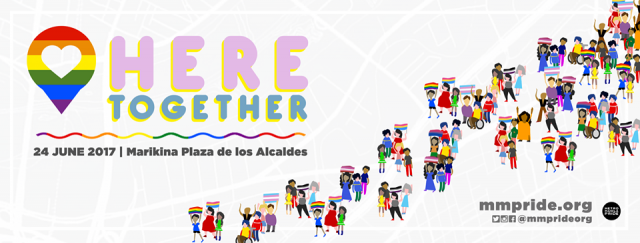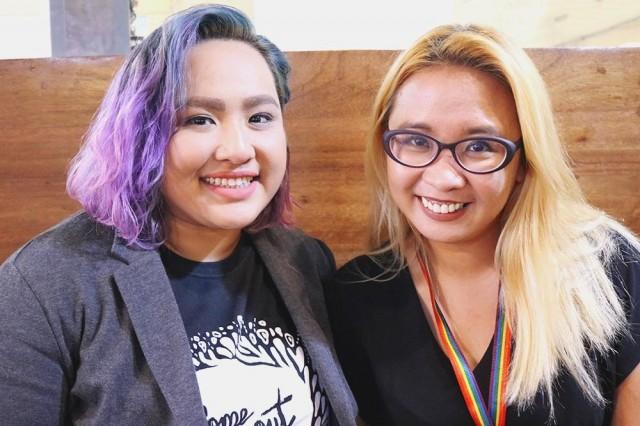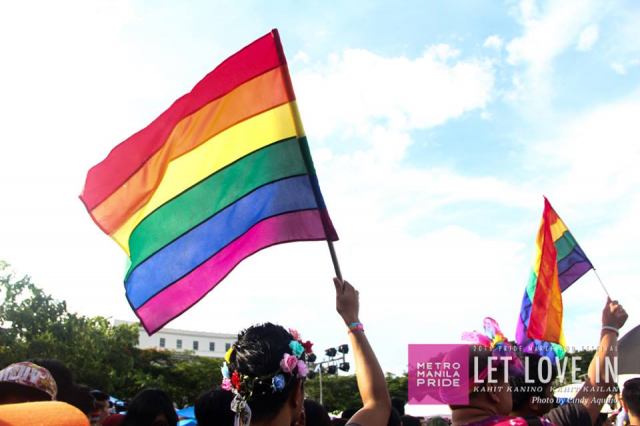Metro Manila Pride: This is what keeps the community marching
In 2017, John Raspado became the first Filipino and Southeast Asian to win the Mr. Gay World title. This victory may not impress everyone, but it's an important one for the community. In the larger fight, every triumph counts. A pin in the map of a world that continues to change, for better or worse.
This year we also saw Taiwan's high court vote in favor of love and the nation could be the first in Southeast Asia to legalize same-sex marriage. But as we were celebrating this win, news broke out that two men were sentenced to caning in Indonesia for expressing their sexuality.
In the Philippines, the LGBT community acknowledges the efforts of those who fought for the freedoms we all enjoy today. In an interview with GMA News Online, Pride March co-coordinators Loreen Ordoño and Nicky Castillo shared that this year's theme, #HereTogether, touches on that history and everything that has yet to be written.
The political climate seems extreme, but Castillo asserted that the fight for freedom is not any more or any less important. It has always been necessary.
"We've always needed it. For me, it's unfair to say na mas kailangan ngayon than before. Today we have a lot more freedom and resources," she shared. "We've always needed all of these voices, all the time. We need your passion, activism, and support whether you're LGBT or not."
The pair explained that #HereTogether is a "beacon trying to call everyone out towards the campaign of acceptance and equality."

It's for the out and proud person who has been fighting since day one. It's for the allies who have always pledged their support and who continues to stand beside the LGBT community.
#HereTogether is also for those who are unable to march — those whose environment are too hostile and those who have fallen victims to extreme prejudice or to a disease that could be managed better, if only the stigma weren't so overwhelming.
This is a reality that people who are outside the community can choose to turn away from.
The lack of access to information and facilities to manage HIV/AIDS is criminal — testing for infection is free and the medication is available, but the fear of stigma is the hardest to conquer.
Homosexuality and trans identity continue to be acceptable punchlines, leading to bullying and putting young people at risk for self-harm and suicide.
The success of GMA's "My Husband's Lover" and other queer-friendlier portrayals in media have pushed the conversation further, which the community welcomes.
"We've had victories... marginally mas tanggap na siya in mainstream media, you see a lot more positive representation, but still not enough," Castillo said.
Positive representation is just one part of the fight for equality. Legal protection from discrimination still seems out of reach and as long as some Filipinos remain oppressed, the march continues.
"At the core, Pride March is a protest. It's our small contribution towards the bigger goal of achieving equality among all sexes, regardless of your class and race. But, here in the Philippines, the Anti-Discrimination Bill has been languishing in Congress for the past 18 years," Ordoño explained.
Castillo added, "The Pride March is needed because a lot of people still don't get, still don't experience that kind of freedom that heterosexual couples usually do."

"Right now we have Anti-Discrimination Ordinances. We don't have a bill, but we have ordinances in the cities and provinces that protect against discrimination based on SOGIE or sexual orientation, gender identity, and gender expression.
"The Anti-Discrimination Bill is not just for the LGBT people. It's not a special law, it's not a special piece of legislation for us. It protects people against SOGIE-based discrimination and everybody has SOGIE," Castillo explained further.
Say a woman applies for a job in a factory and she meets all the requirements necessary for the position...but, the manager doesn't feel like a woman can handle the job and turns her down.
Under the provisions of the Anti-Discrimination Bill, this preference for a man in an otherwise non-gender specific work would be illegal.
Of course, legislation is powerless without enforcement and Castillo shared the harsh truth that discrimination often starts at home and it remains strongest at home.
Think of Trisha from "Die Beautiful" and the family she found outside of her home. With Barbs and her friends, Trisha finds comfort — something she never received from her father, who questioned her very identity.
"The Pride March is a space for people who do not have that kind of acceptance in the home. They can come here among strangers, among people they don't know and who you might never see again...and you feel safe and you feel like you're home. That's the reason why we still need it," Castillo said.
Pride March is a safe place, which Ordoño defines as "a place wherein you are free to be who you are, to be your authentic self, to live your truth."
"You can't be a fully-functional member of society if you are not you," she added.Safe spaces aren't a new invention by millennials — it's the space you a straight man shares with his barkada on a Friday night, when he is out drinking at his favorite bar. The acceptance provided by amigas at lunch is a safe space, even if they're talking about what's wrong with teens these days.

Solidarity in the face of a common enemy is a safe space and though we all have personal battles, some have access to an army while others fight titans with a fork.
Both Castillo and Ordoño acknowledged that the different people experience the weight of the systems of oppression in varying degrees. The persecution of a gay farmer from a far-flung area is not the same as the crisis faced by a millionaire who is trapped in the closet.
#HereTogether, in a sense, is a way to share the privilege — the privilege to march, the privilege to create a safe place for those who need it.
"The safe space that we provide in Pride, it might not be enough for this senior gay man who is living in Zamboanga and 'yong safe space na pinoprovide namin might not be something a rich, upper class, famous gay man needs.
"But somewhere in the middle, a 16-year-old person who's starting college na Catholic school who might identify as trans...'yong space na kailangan nila might be something we can provide," Castillo explained.
A survey conducted by Metro Manila Pride reveals that the main problems that their attendees (usually 18 to 37 years old) face are feelings of being alone, lack of acceptance in the home, and discrimination in the work place.
These problems seem simple, but perhaps that's the point. This could all be solved, yet it hasn't been. Until people are free to love openly, without hiding and without guilt, the march continues.—AT / LA, GMA News



